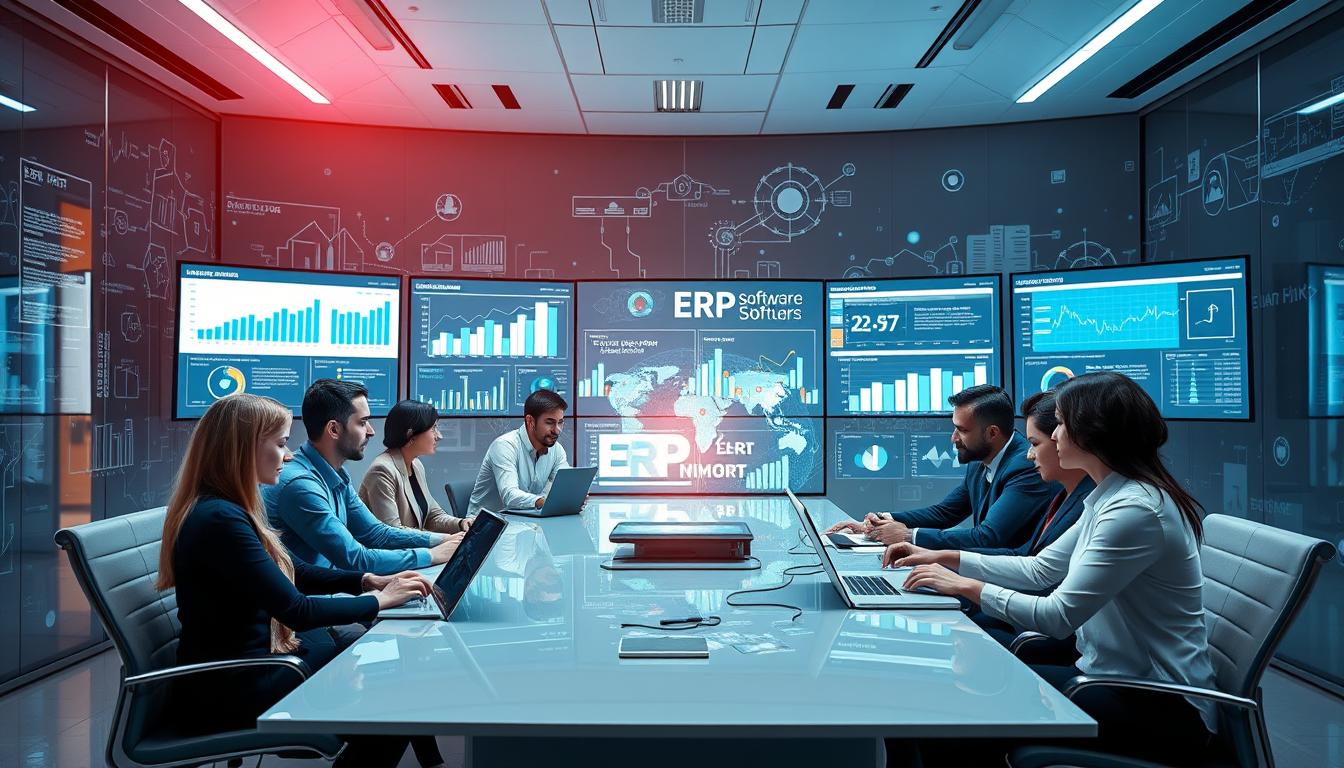ERP software is key for B2B companies to make their operations smoother and more efficient. The ERP market is set to expand rapidly, thanks to cloud-based solutions becoming more popular. These systems help manage finance, human resources, and supply chains all in one place.
More and more businesses are searching for the best ERP systems for their needs. With so many choices, finding the right one can be tough. This article will cover the top 25 ERP software solutions for B2B companies, focusing on their main features and advantages.


 By using strong ERP security and compliance features, businesses can lower data breach risks. They also make sure their ERP system meets all rules.
By using strong ERP security and compliance features, businesses can lower data breach risks. They also make sure their ERP system meets all rules.
https://www.striven.com/blog/maximizing-online-visibility-seo-strategies-for-erp-websites
Key Takeaways
- ERP software solutions are crucial for B2B businesses to improve efficiency and streamline operations.

- cloud-based ERP solutions are driving the growth of the ERP market
- B2B ERP systems provide a comprehensive platform for managing various aspects of a business
- The top 25 ERP software solutions will be discussed in this article
- ERP software solutions can help businesses improve their bottom line and increase productivity
- he ERP market is expected to grow significantly in the next few years
- Cloud-based ERP solutions are driving the growth of the ERP market
- B2B ERP systems provide a comprehensive platform for managing various aspects of a business
- The top 25 ERP software solutions will be discussed in this article
- ERP software solutions can help businesses improve their bottom line and increase productivity
Understanding Business Management Software
ERP software helps businesses manage their operations. It includes financials, human resources, and supply chain management. This software makes processes smoother, improves efficiency, and cuts costs. ERP software integrates all parts of a business. It gives a single view of the company. This helps businesses make better decisions and grow.Everything You Need To Know About Business Key Insights And Strategies For Success
Definition and Core Components
ERP software has key parts like financial management and supply chain management. These parts work together. They give a full view of the business, helping it run better.Evolution of ERP Systems
ERP systems have changed a lot over time. Today, they are more flexible and easy to use. Many ERP solutions are cloud-based, making them accessible to all businesses.Benefits for B2B Organizations
ERP software offers many benefits to B2B companies. It makes processes more efficient and cuts costs. It also helps businesses make better decisions and grow.Best 50 Project Management Tools For B2B Of 2025
Key Features of Modern ERP Solutions
Modern ERP software solutions bring many features that change how businesses work. Cloud-based ERP makes companies more flexible and scalable. This lets them quickly adapt to market changes. Some key features include:- Cloud-based deployment for increased flexibility and scalability
- Mobile accessibility for remote work and improved collaboration
- Advanced analytics for enhanced decision-making and business insights
By investing in modern ERP solutions, businesses can reap significant benefits, including improved efficiency, increased agility, and enhanced competitiveness.
Everything You Need To Know About Business Key Insights And Strategies For Success
Best Business Management Software Options for 2024
The ERP market is led by big names like SAP, Oracle, and Microsoft. They offer a variety of B2B ERP systems. It's key to pick an ERP that fits your company's needs.Market Leaders
Top ERP providers offer full solutions with advanced features and growth potential. These are great for big companies because they can be tailored and flexible.The Ultimate Guide To B2B Lead Generation
Mid-Market Solutions
For smaller and medium-sized businesses, mid-market solutions are perfect. They are affordable and easy to set up. They're great for companies with small IT budgets.Industry-Specific Options
Some ERPs are made for specific industries like manufacturing, healthcare, or finance. They have features that solve the unique problems of each field. This makes them a good choice for companies looking for a solution that fits their industry. When looking at ERP software for 2024, think about scalability, flexibility, and customization. This ensures you pick a system that supports your company's growth and success.Comprehensive Guide To Business To Business B2B Development
Essential Selection Criteria for B2B ERP Software
Choosing the right ERP software is crucial for businesses. Functionality is key, as it affects the software's ability to handle core business tasks. Scalability is also vital, allowing the software to adapt as the business grows. The total cost of ownership is another important factor. It includes the initial cost and ongoing expenses for maintenance and support. Businesses should also consider the implementation time and the level of training and support offered by the vendor. Evaluating these factors helps businesses make an informed choice. Some key considerations for B2B ERP software selection include:- Functionality and features
- Scalability and flexibility
- Total cost of ownership
- Implementation time and support
- Training and ongoing maintenance
All Types Of Software For B2B Businesses
Cloud-Based vs. On-Premise ERP Solutions
Businesses face a choice between cloud-based and on-premise ERP systems. Each has its own set of benefits and drawbacks. The right choice depends on what the business needs and wants to achieve. Cloud-based ERP is great for flexibility and growing quickly. On-premise ERP offers more control and security, as it's hosted on the company's servers. Cloud-based ERP is popular for its quick setup and low costs. It lets companies start using the system fast, without big upfront expenses. On the other hand, on-premise ERP is best for those needing top security and control, like finance and healthcare.The Importance Of Sustainability In B2B
Advantages of Cloud ERP
- Greater flexibility and scalability
- Rapid deployment and minimal upfront costs
- Automatic software updates and maintenance
Benefits of On-Premise Systems
- More control and security
- Customization and integration with existing systems
- No reliance on internet connectivity
| ERP Solution | Advantages | Disadvantages |
|---|---|---|
| Cloud-Based ERP | Flexibility, scalability, rapid deployment | Security concerns, reliance on internet connectivity |
| On-Premise ERP | Control, security, customization | High upfront costs, maintenance and updates required |
Implementation Strategies and Best Practices
A successful ERP implementation needs careful planning. This includes defining the project scope, setting up a project team, and creating a training plan. These steps help make the transition to new business management software smooth. They also reduce disruptions to daily work. Some key practices for ERP implementation are:- Phased implementation to lower risk and allow for testing and evaluation
- Ongoing support and maintenance to keep the system up to date
- Regular training and updates for employees to help them get used to the new system

A well-planned ERP implementation is crucial to the success of the project, and it's essential to take the time to do it right.
Adapting To The Digital Transformation In B2B
Cost Considerations and ROI Analysis
When you get an Business Management Software system, think about the total cost. This includes the initial cost, ongoing maintenance, and expected return on investment (ROI). Knowing these costs helps you decide which ERP to choose. The first cost is the ERP software itself. This includes the license, setup, and training. Then, there are ongoing costs like support and maintenance. By looking at these costs and benefits, you can see if the ERP is worth it.15 Key Metrics For B2B Success
Breaking Down ERP Costs
- Software licenses: The initial cost of purchasing or subscribing to the ERP software
- Implementation costs: The cost of configuring and deploying the ERP system
- Training expenses: The cost of training employees to use the new ERP system
- Support and maintenance fees: Ongoing costs for maintaining and supporting the ERP system
The Impact Of Globalization On B2B Markets
Expected Return on Investment
A good ERP system can really help a business. It can make things more efficient, cut costs, and boost productivity. By looking at the expected ROI, you can see if the ERP will help your business grow.Integration Capabilities and API Support
ERP software needs strong integration capabilities to work well with other business systems. This integration lets businesses link their ERP with apps like CRM or SCM. It makes processes smoother and boosts efficiency. API support is key too, as it lets ERP systems connect with custom apps or third-party services. Some big pluses of ERP integration and API support are:- Improved efficiency: Automated data exchange cuts down on errors and boosts productivity.
- Enhanced decision-making: A unified view of data helps make better choices.
- Increased flexibility: API support lets businesses tailor their ERP to fit their needs.
How To Building Strong B2B Relationships
Security and Compliance Features
Business Management Software must focus on security and compliance. ERP security protects sensitive business data from unauthorized access. Compliance features make sure the software follows regulatory rules. A good ERP system has strong security layers. These include data encryption, access controls, and audit trails. These help stop data breaches and track all system activities.The Future Of B2B Marketing Strategies
Data Protection Measures
Some important data protection steps are:- Encryption of sensitive data
- Secure access controls, such as passwords and two-factor authentication
- Regular backups and disaster recovery procedures
B2B Success In The Digital Age How Technology Drives Revenue And Efficiency
Industry Standards
ERP software must follow industry standards like GDPR and HIPAA. This ensures sensitive data is handled and stored safely. By using strong ERP security and compliance features, businesses can lower data breach risks. They also make sure their ERP system meets all rules.
By using strong ERP security and compliance features, businesses can lower data breach risks. They also make sure their ERP system meets all rules.
| Feature | Description |
|---|---|
| Access Controls | Secure access to the system using passwords and two-factor authentication |
| Data Encryption | Encrypt sensitive data to prevent unauthorized access |
| Audit Trails | Track and record all activities within the system |
Mobile Accessibility and Remote Work Support
Businesses are changing fast, and mobile ERP solutions are key. With more people working from home, having access to work data anywhere is essential. Remote work support is now a must for companies to keep up. Mobile ERP lets employees work well from anywhere, anytime. The perks of mobile ERP and remote work support are many. For example, it lets employees:- Get to business data and reports instantly
- Manage tasks and projects from afar
- Work together with team members no matter where they are
- Boost productivity and cut costs
Importance Of B2B In The Modern Economy Of 2025
Customer Support and Training Resources
When you choose an ERP system, think about the support and training you'll get. Good ERP support is key for a smooth start and ongoing use. Also, having the right training resources can greatly help users adapt and succeed. ERP vendors should have strong ERP support options. This includes online help, phone support, and in-person training. You should have access to guides, tutorials, and forums where you can ask and share tips.Vendor Support Options
- Online support portals with knowledge bases and FAQs
- Phone and email support for urgent issues
The Evolution Of B2B Markets Key Milestones And Trends Of 2025
Training Programs
Good training programs are essential for getting the most from your ERP system. These should include various training resources. Think video tutorials, webinars, and hands-on training sessions.Community Resources
ERP systems also have active community resources. These include user groups and online forums. They offer insights and support from both experts and experienced users.| Resource Type | Description |
|---|---|
| Online Forums | Community-driven forums for discussing ERP-related topics |
| User Groups | Local or industry-specific groups for sharing knowledge and best practices |
| Webinars | Online training sessions on various ERP topics and features |
Conclusion
ERP software is a game-changer for businesses. It helps them work better, faster, and grow stronger. In today's digital world, having a good ERP system is key for companies to stay ahead. ERP software brings together all important business tasks. It helps manage data, automate processes, and make quick decisions. No matter if you're a big leader or a growing company, the right ERP software can boost your performance and save costs. When looking for ERP solutions, think about what your business needs. Consider your industry and future goals. Choosing the right ERP can make your technology investment pay off big time.FAQ
What is Business Management Software?
ERP software helps businesses manage their operations. It covers financials, human resources, and supply chain management.
What are the core components of ERP software?
ERP software includes financial management, inventory management, and production planning. It also covers human resources and customer relationship management (CRM).
How has ERP software evolved over time?
ERP software has changed from traditional on-premise solutions to cloud-based and hybrid models. These changes offer more flexibility and accessibility. Modern ERP solutions also include advanced analytics and mobile access.
What are the benefits of using ERP software for B2B organizations?
ERP software improves efficiency and reduces costs for B2B organizations. It also enhances decision-making and inventory management.
What are the key features of modern ERP solutions?
Modern ERP solutions are cloud-based and mobile-friendly. They offer advanced analytics and integrate well with other systems.
What are the best ERP software options for B2B businesses in 2024?
Top ERP software for B2B businesses in 2024 includes SAP, Oracle, and Microsoft. There are also mid-market and industry-specific options available.
What are the essential selection criteria for choosing the right ERP software for a B2B business?
B2B businesses should look at functionality, scalability, and total cost of ownership. They should also consider implementation time, training, and ongoing support.
What are the pros and cons of cloud-based and on-premise ERP solutions?
Cloud-based ERP offers flexibility and scalability. On-premise solutions provide control and security. Hybrid solutions combine both.
What are the key strategies and best practices for successful ERP implementation?
Successful ERP implementation needs careful planning. This includes defining project scope and establishing a team. A training plan and phased implementation are also crucial. Ongoing support and maintenance are essential.
How can businesses analyze the cost and ROI of ERP software?
Businesses should look at initial investment, maintenance costs, and expected ROI. Improved efficiency and reduced costs are key factors.
What are the integration capabilities and API support of modern ERP solutions?
Modern ERP solutions should integrate well with other systems. This improves efficiency and reduces costs.
What are the security and compliance features of ERP software?
ERP software must have strong security and compliance features. This includes data encryption and audit trails to protect data and ensure compliance.
How do mobile accessibility and remote work support enhance the value of ERP software?
Mobile accessibility and remote work support improve productivity. They allow employees to work from anywhere, reducing costs.
What customer support and training resources are available for ERP software?
ERP vendors should offer robust customer support and training. Comprehensive programs and active community resources help with successful implementation and ongoing use.

